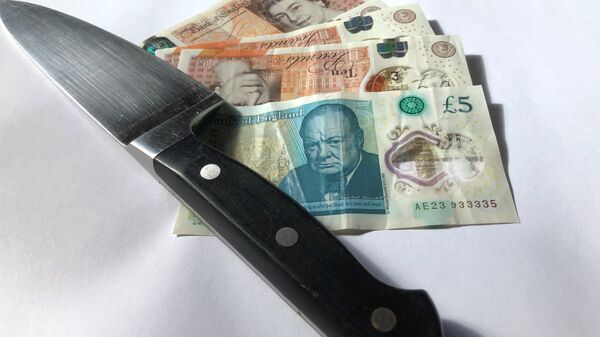This proactive move by the police has been praised, especially in the wake of the crime epidemic in London and the UK.
Sputnik has discussed the matter with Robert McLean, a lecturer at the University of the West of Scotland.
Sputnik: We're seeing police forces going after foreign exchange and currency transfer businesses; can you describe the kind of laundering that goes on there and how that affects criminal activity?
McLean: With regards to money laundering, it can often be a very complex issue involving in a number of actors and the range of the actors very much depends upon the implicitly of them involved. So for example, some businesses may have very little knowledge that they're being used for money laundering. Whereas others will have people that have been most entrenched in money laundering behaviour and manipulate the services, to kind of disguise the processes involved.
So regarding money laundering itself it really works on the general principle, that drugs (or whatever the crime is, let’s say drug dealing) goes one way so drugs go one way, and the money, of course, goes back along the supply chain in the other direction. But often involved in for example drug dealing the money can be with lots and lots of small currency so you can't just send that back. So it will be laundered through processes and through different businesses that will make it look legitimate before it goes back to the criminals essential making it clean so they can spend it and use it to purchase other goods.
Sputnik: And already two charges have been made; eleven more people are currently in police custody. A similar operation happened in 2011. Do you think that was a success?
McLean: Yeah. Actually, in a couple of recent interviews, I've had with people at the head of the Criminal Justice Department, I've always voiced that we need to be been chasing the money, as opposed to you know, in terms of drug dealing, chasing the drugs. Because people at the top very often won't handle the commodity, whether it be drugs or humans or firearms, but what they will always handle is the money.
So what you have to do is, of course, chase the money because it’s the only way to stop what goes on, and it's a very, it's a lynchpin area for those involved. So every process, no matter what the criminality is, whatever the commodity is they're selling, they will always handle money and always come back through the same processes. So it can be a very time-consuming operation for those involved. But you know, it's one that can halt criminality at its very source, so yeah, I welcome the approach.
Sputnik: Beyond this, the police force has received a lot of criticism this year, despite cuts to their funding. Given the increase in violent crime in the UK, this is quite a proactive measure for the police. What other measures do you think could be undertaken to tackle gang crime and illegal operations?
McLean: Yeah, well, I think you have to really tackle crime at the source and chasing the money is one way to do that. In terms of one of the recent phenomena such as county lines; what the police had been finding, particularly with the decimation of front line services through continued cuts and of course continued cuts to the police themselves, is they didn't have the resources to effectively tackle a phenomenon such as county lines.
And also what you're doing is, when you're picking up people at the bottom of the scale, all they're doing is simply being replaced. So of course, you know, chasing higher-up criminals tends to be much more successful and that's been found to be true as well. In Scotland with a recent arrest of a nine-strong serious organised crime group who had been involved firearm distribution, money laundering, drug sales, etc, etc. And just through chasing up the higher echelons of the criminality and following up with good police work, to be honest. They've been able to unmask an operation that has been going on for several decades.
And prior to that, previous tactics didn't reveal the extent of criminality involved. So yeah, I think the best thing to do is chase the money and then of course, other proactive measures: the police have got to, of course, calculate what they do in terms of how best to allocate the funding they are given. But really you need more funding to come to the police, in particular, front line services that engage with youth and victims and offenders on the street, at street level.
The views expressed in this article are solely those of Robert McLean and do not necessarily reflect the official position of Sputnik.



